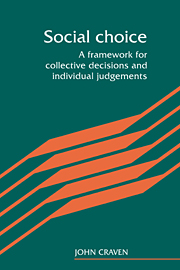3 - Arrow's theorem
Published online by Cambridge University Press: 15 September 2009
Summary
Social choice rules
The central theme of social choice theory concerns the possibility of combining individuals' preferences to give a social choice from a set of alternatives. The simplest contexts to consider are where the social choice is to be implemented by some individual – a returning officer who announces the result of an election, an ideal public official who decides on areas of public policy – or where social choices are in fact the ethical statements of an individual who has taken into account the preferences of other individuals even though these may conflict with his own personal interests.
Throughout this book, we use the following definition. A social choice rule aggregates the preferences of all individuals to give a social choice set (consisting of one or more alternatives) from the set of alternatives, and from some or all of the subsets of the alternatives. So, for example, the method of determining from votes cast or preferences stated which candidate(s) win an election is a social choice rule.
In many contexts, it is useful to examine specific social choice rules (such as majority voting in committees; first-past-the-post). However, this case-by-case approach leads to the methodological difficulty that we might never exhaust the list of possible methods.
- Type
- Chapter
- Information
- Social ChoiceA Framework for Collective Decisions and Individual Judgements, pp. 29 - 50Publisher: Cambridge University PressPrint publication year: 1992



